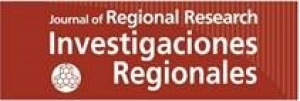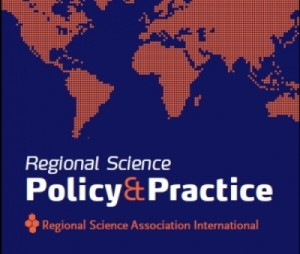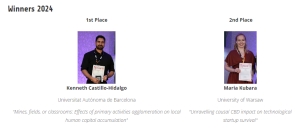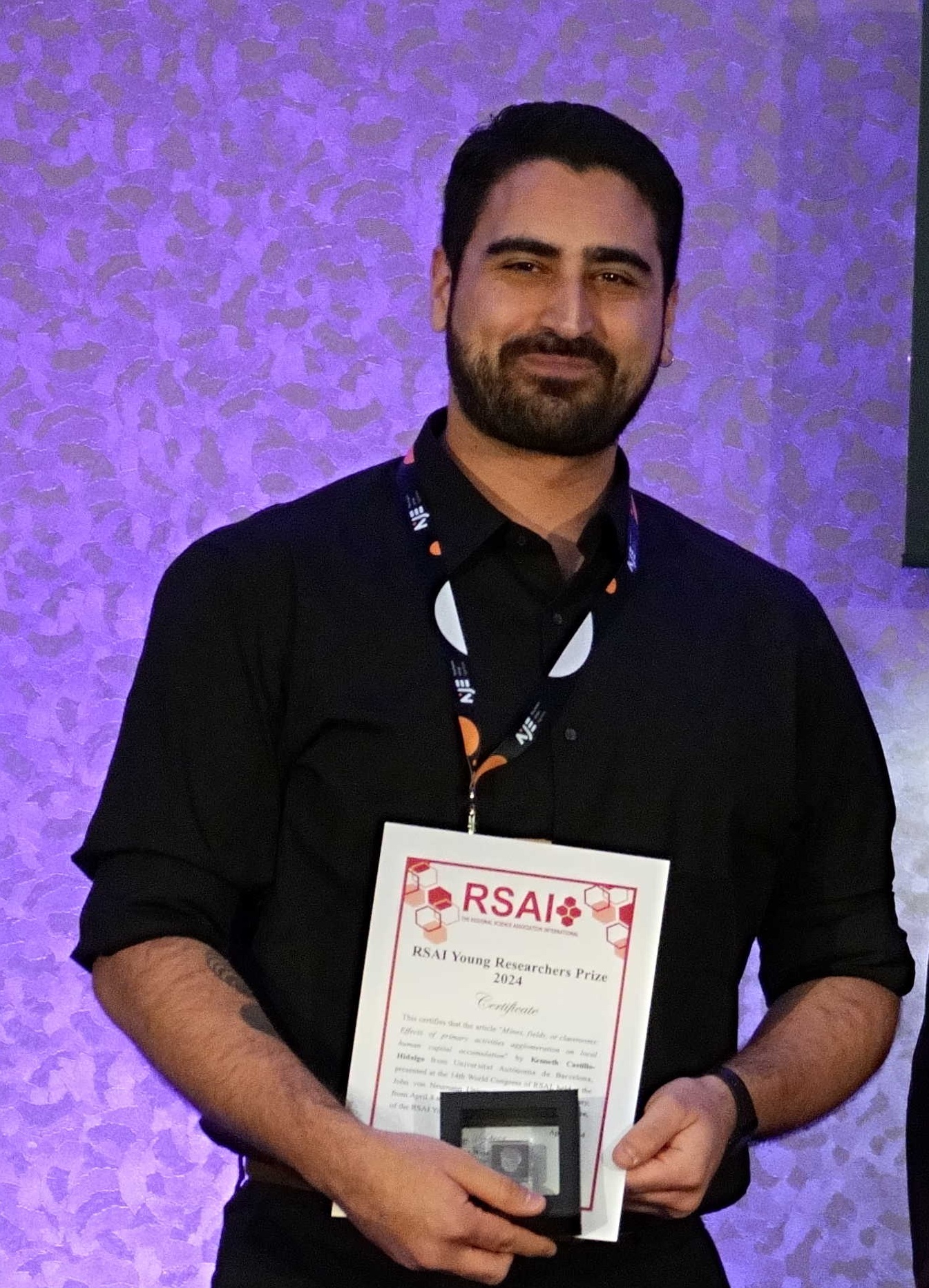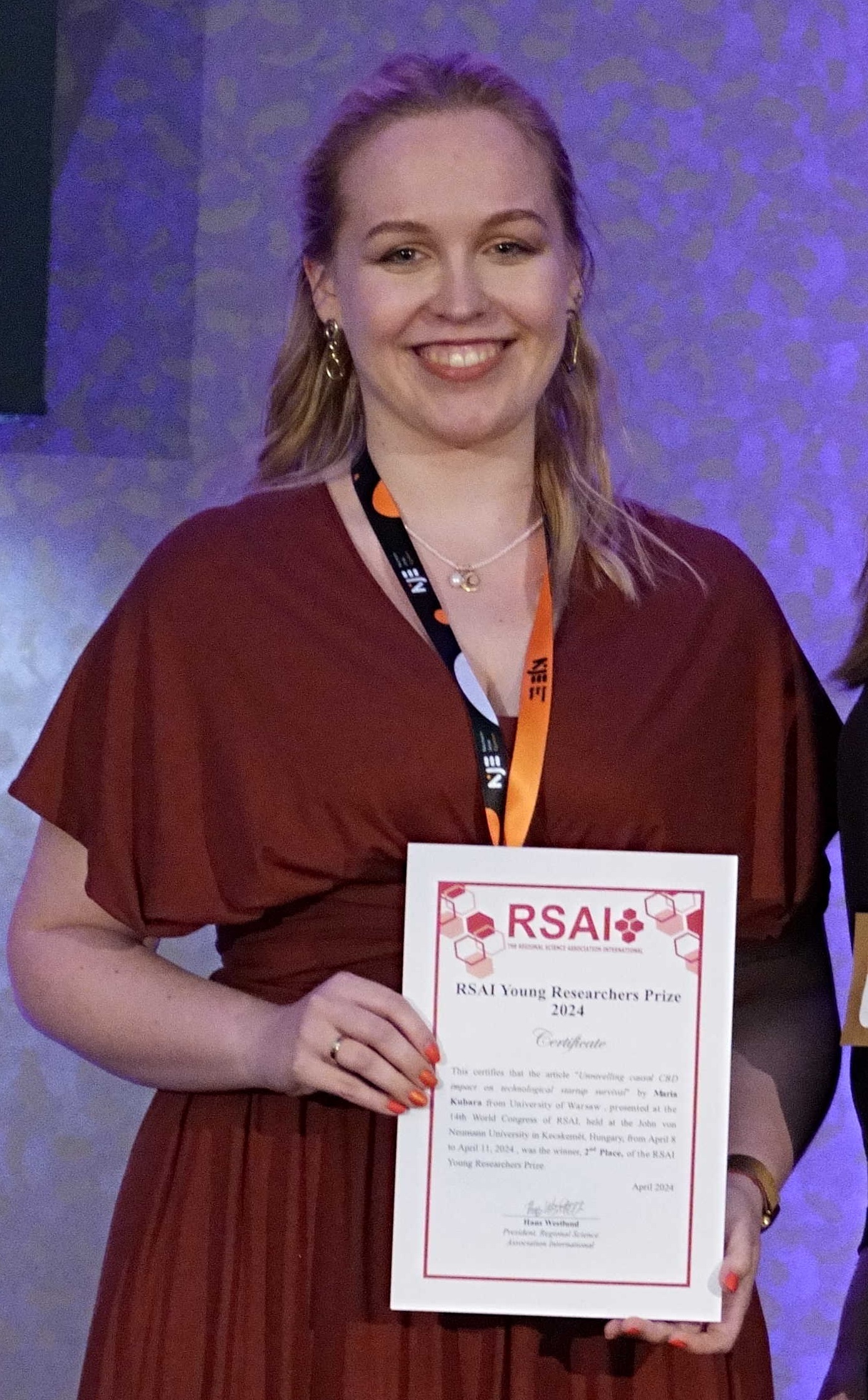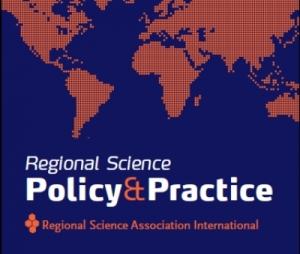Papers in Regional Science
Elisabete Martins
Summer Institute on Exploring ‘X-Factor of a City’, July 8-12, 2024, Faculty of Economics, Technical University of Košice, Slovakia
Summer Institute on Exploring ‘X-Factor of a City’
The Summer School in Košice, Slovak Republic, promoted by RSAI (the Regional Science Association International), is organized by Ulysseus, the European University Alliance. This program offers a unique, interactive opportunity to acquire new knowledge and explore the X-factor that enhances city well-being. The week-long program, running from July 8 to July 12, 2024, will be conducted in-person at the Faculty of Economics, Technical University of Košice, Slovakia. To prepare participants, a hybrid Summer Institute kick-off will be held at the beginning of June to distribute factsheets, data, and essential information.
This interactive program warmly welcomes PhD students and young scientists who are keen to explore urban dynamics and engage with innovative methodologies and big data integration in a dynamic learning environment. It will also feature high-quality keynote speakers, and experts in urban development, who will provide valuable insights and foster stimulating discussions.
Organized by Ulysseus, the European University Alliance—Technical University of Košice (Slovakia), University of Seville (Spain), University of Côte d'Azur (France), and University of Genoa (Italy).
Website: https://summerinstitute.tuke.sk/
Contact: This email address is being protected from spambots. You need JavaScript enabled to view it.
ERSA Monthly E-news - April 2024
|
|
|
|
|
|
|
|
|
|
|
|
|
|
|
|
|
|
|
|
|
|
|
|
|
|
|
|
|
|
|
|
ERSA Congress 2024 | Hurry! Early-bird registration ending soon - Updates on the Agenda
|
|
|
|
|
|
|
|
|
|
|
|
|
|
New Issue 59 of Investigaciones Regionales - Journal of Regional Research
Investigaciones Regionales - Journal of Regional Research has published the 59th Issue, the second volume corresponding to 2024.
Below you will find the summaries of the papers published in this volume, which can be accessed at https://investigacionesregionales.org/en/revista/issue-59/
We invite authors to submit papers at https://investigacionesregionales.org/en/envio-de-articulos/submission-of-papers-and-others-contributions/
Issue 59
European Regional Policy
Julián Moral-Carcedo, Carlos Llano-Verduras
How integrated regional financial markets are in Europe? A first gauge based on active securitised loans
Little is known about the degree of integration of financial markets at subnational level in the EU. This article provides new evidence on interregional loan flows within Europe. Building on the “Loan Level Initiative” launched by the ECB, with more than 35 million active loans, we built a georeferenced dataset of securitised loans, covering the period 2014-2018 and the 166 European NUTS 2 regions for which data exists. After reviewing the complex nature of the dataset, we explored its geographical dimension, and conduct an econometric analysis focused on explaining the regional demand for such loans, using different explanatory variables related to the geographic and the socio-economic features of the regions, and alternative panel data specifications (classic versus spatial econometric ones).
Keywords: Capital flows; loans; securitized loans; European financial integration
Articles
Víctor Hugo Torres Preciado, Pablo Mejía Reyes
Dynamic interaction between permanent and temporary employment across manufacturing labor markets in the Mexican states: A structural panel VAR approach
México’s implementation of several labor market reforms aimed to stimulate the flexibilization of labor relationships have brought long-standing concerns among scholars and governmental authorities about a displacement process of permanent by temporary jobs. In this regard, this manuscript aims to respond whether the dynamic interaction between permanent and temporary employment across Mexican states describe a substitution or complementary relationship. By means of implementing a structural panel vector autoregressive model, our estimation results demonstrate that a combination of both types of interaction, substitutive and complementary ones, prevail across manufacturing labor markets at state level. Moreover, a marked heterogeneity among estimated dynamic responses suggests that incentivizing permanent employment would induce stronger substitution effects on its temporary counterpart than, for example, substitution of permanent job positions arising when incentivizing temporary employment.
Keywords: Permanent employment; temporary employment; regional labor markets; México; structural panel VAR
Rudy Fernández-Escobedo, Begoña Eguía-Peña, Leire Aldaz-Odriozola
Cluster mapping in Spain: Exploring the correlation between industrial agglomeration and regional performance
This paper presents a quantitative cluster mapping methodology for traded industries, adapted for the Spanish case; also explores the correlation between the existence of clusters and regional performance. The study is made at NUTS-2 level, and a total of forty-seven out of eighty-eight 2-digits codes for CNAE-2009 are analyzed; ICT Index and Industry 4.0 Index are also designed and computed. A six-step methodology is applied departing from cross-industry linkages and implementing clustering algorithms; one set of clusters is elected and mapped over territory. The correlation analysis shows that a high number of clusters based on absolute employment data is positively correlated with variables associated with competitiveness, education, ICT adoption, and Industry 4.0, while no significant correlation is found for GDP per capita nor earning per worker.
Keywords: Cluster analysis; agglomeration economics; Industry 4.0; classification methods; industrial agglomeration
Sylvina Porras-Arena, Ángel L. Martín-Román, Diego Dueñas Fernández, Raquel Llorente Heras
Okun’s Law: The effects of the COVID-19 pandemic and the temporary layoffs procedures (ERTEs) on Spanish regions
Official statistics indicated a break in Okun’s law in all the Spanish regions due to the COVID-19 pandemic; however, herein, evidence of the validity of the law is shown. The temporary layoff procedures (ERTEs) allowed many workers to maintain their jobs. From the productive point of view, the law remained in effect in the regions, showing a strong relationship between idle labour resources and economic activity, and from the social point of view, the apparent breakdown of the law can be interpreted as the implementation of a policy that mitigated the dramatic impact of the economic crisis.
Keywords: Okun’s law; ERTE; expanded unemployment rate
Angel Aronés Cisneros, Anna Badia Perpinyà, Jordi Nadal Tersa, Vivien Bonnesoeur
Forest fires in ecosystems of the humid puna in the Andes of Ayacucho, Peru
This research analyzes the extent and frequency of forest fires in the humid puna ecosystem from 2013 to 2021, identifying the affected areas and determining the causes in order to improve fire management in the department of Ayacucho (Andean region). from Peru). The methodology combines cartographic analysis, satellite images and semi-structured interviews to identify the causes, consequences and mitigation alternatives of the fires. The results show that the areas affected by the fires during the 9 years are very differentiated, with 2020 being the year with the largest burned area, reaching 2,836 ha, which represents 14.89% of the humid puna of the study area. In addition, the most frequently burned areas are repeated between 7 and 9 times in different years, with an average of 182 ha burned recurrently. The causes of the fires are clearly of anthropic origin caused by the (i) opening of new fields or burning of stubble; (ii) ichu burning for pasture regrowth and (iii) for cultural reasons. It is concluded that the combination of cartographic analysis methodology, satellite images and semi-structured interviews provide information that allows understanding the dynamics of the territory and improve the management and implementation of territorial policies in the mitigation of fires.
Keywords: Forest fires; satellite images; Andes; humid puna
Serafín Ojeda Casares, Joaquín Valverde Martínez, Ana Ramírez Torres, Iria Enrique Regueira
The statistical grid as a unit of observation and analysis: Andalu-sia, Spanish region case study
Units of observation with reduced dimensions and regular geometry have been increasingly generated in a recent, albeit already steady, trend towards further territorial data disaggregation. In this line of research, the present study reports the results of using the spatial distribution of population data and built-up areas at a high level of territorial data disaggregation with reduced dimensions and with a homogeneous observation unit by applying a regular grid consisting of 250-m square cells. The main objective was to show the results and advantages of working at a high level of spatial data disaggregation. This approach provides a more comprehensive knowledge of the territory and allows for a more accurate analysis of spatial patterns in the different variables under study, thereby enhancing the quality of decision-making processes.
Keywords: Grid; population; cadastre; building; dwelling
Angela Caro, Julia De Haro-García
The waiting times distribution of public hospitals using a GAMLSS approach: the case of Andalusia (Spain)
Patients’ waiting times are caused by the imbalance between the available supply and the existing demand in the health sector. Exceeding maximum waiting times may worsen diseases and entail additional costs to public health systems. This paper studies the theoretical probability distribution that best fits the average waiting times for non-urgent surgeries and first outpatient consultations for Spanish public hospitals in the region of Andalusia. For doing this we apply Generalized Additive Models for Location, Scale and Shape, which cover a wide range of probability distributions. We propose the final selected models as a tool to be considered by health authorities for a better management of waiting times/lists.
Keywords: Model selection; GAIC; GAMLSS; waiting lists; waiting times
Pablo Galaso, Fernando Masi Fadlala, Santiago Picasso, Adrián Rodríguez Miranda, María Belén Servín Belotto
Collaboration networks, support organisations and innovation in Paraguayan clusters
This article examines the role of support organizations (SOs) in promoting innovation and competitiveness in Paraguayan companies. Six important clusters in the country are analyzed: meat and derivatives, dairy, ceramics and construction, textiles, pharmaceuticals, and chemicals. Collaboration networks are reconstructed using data from interviews with companies and SOs. Network analysis, econometric regressions, and qualitative analysis of the interviews are employed. The results reveal how companies access external resources to enhance their competitiveness and foster innovation through cluster SOs. In the context of a developing country, cooperation between these organizations in cross-sector and crossterritory networks is crucial.
Keywords: Industrial clusters; social network analysis; regional development; support organisations; Paraguay
Manuel Gómez-Zaldívar, Fernando Gómez-Zaldívar, José Luis Carrillo Ramírez
Calculation of Complexity Indices for Mexico: Proposal for a more periodic and robust estimation
The Economic Complexity Index (ECI) and Product Complexity Index (PCI), proposed by Hidalgo and Hausmann (2009), are measures that quantify the sophistication of productive knowledge that economies (industries) posses (require to produce). These indexes have been frequently used in the economic geography and economic development literature for the optimal design of industrial strategies. In the original study, these authors calculated these measures for countries and products using data on the value of their exports. Since then, various studies have estimated them at the subnational level using other variables such as: employment, patents, technologies, salaries, etc. This article presents a proposal for a more periodic and robust estimation of the indices in Mexico using a different variable, the number of establishments or economic units by type of activity, this variable is obtained from the National Statistical Directory of Economic Units (DENUE, its Spanish acronym). The results are consistent, both formunicipalities and for industries, and present a better fit compared to those of previous studies. We consider that our proposal is pertinent because it allows for the design and more periodic evaluation of industrial strategies and subnational public policies in the area of economic development.
Keywords: Economic Complexity Index; Product Complexity Index; DENUE
Winners RSPP Paper Award 2024
RSPP Paper Award 2024
Following the nomination of the 10 best papers by the Editors of 10 Special Issues/Topics published in 2023, the Jury composed by David Plane, Philip McCann, Bruce Newbold, Neil Reid and Tomaz Dentinho agreed that the winners of the 2024 RSPP paper award based on papers published in 2023 were:
X Gao, L Liu, D Ou, H Yuwu (2023), Using mobile phone data to probe the mobility‐ related well‐being of rural residents: A case study of Chengdu, China. Regional Science Policy Practice 2023 15 (9), 1893-1907. DOI: 10.1111/rsp3.12604
Focusing on Chengdu Region in China the paper uses mobile phone data to understand rural mobility and the social and orographic factors that influence it. The look into human mobility in remote rural areas, the innovative use of big data and the clear methodological approach allow robust new evidence on rural mobility and justify adequate policy advises.
AND
Ana Maria Bonomi Barufi, Eduardo Amaral Haddad, Peter Nijkamp (2023), Urban agglomeration, city size, and spatial density effects on wage flexibility: New evidence on the wage curve in Brazil. Regional Science Policy Practice 2023 15 (9) Pages 1998-2026. DOI: 10.1111/rsp3.12669
The paper estimates the relation between wages and unemployment considering spatial interaction. Results show the existence of diverse labor markets and concludes that policy makers should be aware of measures to protect formal jobs that, at local level, can increase the wage with informal workers. It is clearly a very good paper able to generate a new common sense on the functioning of labor markets when space is considered.
Congratulations to the prize winners on their achievement!
Winners of RSAI Young Researchers Prize 2024
| 1st Place | 2nd Place | |
|
Kenneth Castillo-Hidalgo Universitat Autónoma de Barcelona |
Maria Kubara University of Warsaw |
The committee (made up of Balazs Forman, Jozsef Karpati, Ilona Palne-Kovacs, Sarah Low, and Hee-Jung Jun) recommended the two papers the winners of the 2024 RSAI Young Researcher Award:
1st place:
Kenneth Castillo-Hidalgo from Universitat Autónoma de Barcelona wins first prize with his paper titled “Mines, fields, or classrooms: Effects of primary activities agglomeration on local human capital accumulation.” This paper is about the role of human capital in mining and non-mining agglomerations in Chile. Using the Spatial Autocorrelation Model, with excellent sensitivity analyses, he finds that higher mining activity is associated with lower human capital in periods with high copper prices. Its contributions include the spatial and temporal differences in mining’s impacts on human capital and the need for tailored regional development strategies around growing human capital. The committee appreciated this paper’s relevance and regional nature.
2nd place:
Maria Kubara of University of Warsaw wins second prize with her paper titled, “Unravelling causal CBD impact on technological startup survival.” It uses novel machine learning techniques to examine non-linear relations between startups’ initial conditions and locational characteristics. She investigates the impact of Central Business District location on startup growth trajectories, finding that CBD’s influence is dependent upon the startup’s capital endowment, with more capitalized firms benefitting most from CBD location. However, the CBD location becomes less relevant as the startup grows in employment size. The committee appreciated the contribution of new methods to the regional science community.
Congratulations!
The RSAI Young Researchers Prize aims to showcase the research of young scholars in regional science through paper presentation and in-depth discussion organized at the Regional Science Association World Congress.
Winner of The Peter Nijkamp Research Encouragement Award 2024
 Pedro Amaral from Universidade Federal de Minas Gerais, Brazil received the 2024 Peter Nijkamp RSAI Research Encouragement Award for an Mid-Career Scholar from a Developing Country.
Pedro Amaral from Universidade Federal de Minas Gerais, Brazil received the 2024 Peter Nijkamp RSAI Research Encouragement Award for an Mid-Career Scholar from a Developing Country.
The jury for the Peter Nijkamp Research Award 2024, composed of Eduardo Haddad (Chair), Denise Pumain, Tessa Conroy, and Randall Jackson, has carefully reviewed the nominations and research contributions of the applicants.
The committee provided the following text:
"This year, we received four applications, with three of them being highly competitive and closely contending for the award. After thorough consideration, we enthusiastically recommend Pedro Amaral as the recipient of this prestigious award for the following compelling reasons: (i) Pedro Amaral has demonstrated research excellence in the field of regional science, particularly in the areas of spatial analysis and spatial econometrics. Prof. Amaral’s consistent research record since receiving his Ph.D. from the University of Cambridge is commendable. He has consistently produced collaborative high-impact research that contributes significantly to the advancement of regional science and its applications. (ii) Pedro Amaral’s engagement in teaching spatial analysis and spatial econometrics further underscores his commitment to advancing the field. His mentorship of students and dedication to education have a lasting impact on the next generation of regional science scholars. Given Prof. Amaral’s track record of research and his ongoing contributions to regional science, we believe that he has the potential to continue making significant contributions to the field in the years to come. Recognizing his achievements with the Peter Nijkamp Research Award would not only honor his past accomplishments but also inspire future endeavors."
Congratulations!
The Award recognizes the outstanding potential of an mid-career researcher from a nation in the developing world and in which there is a formal Section of RSAI, and seeks to encourage the development of the early career scholar as a high quality researcher in the field of Regional Science and as a participant in the international Regional Science community.
RSPP Call for Papers | Special Issue: Cities Shaping Sustainable Food Systems

Regional Science Policy & Practice (RSPP)
Call for Papers Special Issue: Cities Shaping Sustainable Food Systems
Guest editors
Eveline Van Leeuwen - Wageningen University, Wageningen, Netherlands; This email address is being protected from spambots. You need JavaScript enabled to view it.
Carina Castagna - Wageningen University, Wageningen, Netherlands; This email address is being protected from spambots. You need JavaScript enabled to view it.
The Amsterdam institute for Advanced metropolitan Solutions (AMS Institute) is excited to announce a special issue in the Regional Science, Policy & Practice (RSPP) journal. RSPP will publish a selection of papers from AMS Institute Conference focusing on the crucial role of cities in leading the transition towards sustainable food systems.
Background:
Cities, as hubs of food networks and resources, are pivotal in leading the transition towards sustainable food systems. Urban food systems, shaped by economic, spatial, and cultural dynamics, offer unique opportunities for sustainability transitions. This special issue aims to explore urban food challenges and the role of cities in sustainable local and global food systems.
Focus Areas:
- Social implications of food access, distribution, and consumption in cities
- Cultural influences shaping food practices and preferences in urban environments
- Economic dynamics influencing urban food systems
- The circular economy approach and its relevance to urban food sustainability
- Innovative strategies for mitigating food waste and enhancing byproduct utilization
- Promoting food justice and equity within urban communities
Submission Guidelines:
Authors are invited to submit original research articles and reviews, that contribute to the understanding of urban food systems and sustainability transitions. Manuscripts should adhere to the journal's formatting and submission guidelines.
Deadline:
The deadline for manuscript submissions is January 31, 2025
Manuscript submission information:
All submissions must be original and may not be under review elsewhere. All manuscripts will be submitted via the Regional Science Policy & Practice online submission system (https://www.editorialmanager.com/rspp/). Authors should indicate in the cover letter that the paper is submitted for consideration for publication in this special issue “Cities Shaping Sustainable Food Systems”, otherwise, your submission will be handled as a regular manuscript.
We look forward to receiving your submissions and engaging in insightful discussions on this pressing issue. https://reinventingthecity24.dryfta.com/index.php
2024 APDR Congress | Deadline extension for abstract submission
The call for abstracts has been a great success!
Nevertheless, we are receiving several requests for extending the abstract submission. Therefore, we are happy to announce that the 2024 APDR Congress organizing committee has officially decided to extend the deadline to April 29!
Please submit your abstracts through the Submission System.
Abstracts are accepted in the following languages: Portuguese, English or Spanish. The papers can be presented in one of these three languages.
Stay tuned for further updates!
More information available at http://www.apdr.pt/congresso/2024.
Regards,
The Organizing Committee and the Board of APDR 31st APDR Congress
Call for Papers
The APDR invites regional scientists, economists, sociologists, geographers, urban planners, policy makers, and researchers of related disciplines to participate in the 31st APDR Congress with the theme "Regional Innovation Ecosystems and Sustainable Development" that will be held from 26th to 28th of June, 2024, at Polytechnic University of Leiria (School of Technology and Management), Leiria, Portugal.
In an era defined by dynamic global challenges, regional innovation ecosystems characterized by a strong collaboration between regional actors, both within and across regions, play a pivotal role in fostering sustainable development. As regions navigate the complex interplay between technological advancements, economic resilience, and environmental and digital transition, this congress provides a platform to discuss the diverse strategies employed across different regions to catalyze open and collaborative innovation, as a means to realize the full potential of the new opportunities available at the global level and to enhance societal well-being and sustainable development.
The call for papers are open and your participation is very welcome!
Special Sessions:
SS01 - Territorial intelligence, key to a sustainable future? New challenges and prospects for regional development and growth: data, methods and solutions
Simona Cafieri
SS02 - Public Policy, Neuroeconomics and Behavioral Economics
Michelle Moraes , Orlando Gomes (Chair), Paulo Fagandini, António Morgado and João Vasco Gama
SS03 - Traditional Products and Development of Regions of Origin
Maria Inês Faria (Chair), Fernando Nunes Teixeira, Thiago Meneghel Rodrigues and Cristina Keiko Yamaguchi
SS04 - Media, “News Deserts” and Sustainable Regional Development
Pedro Jerónimo (Chair), Giovanni Ramos, and Luísa Torre
SS05 - New Trends in Telework: Reshaping Work, Business, and Society
Paulo Morgado (Chair) and Eduarda Marques da Costa
SS06 - Advancing Sustainability in the Agri-Food Chain: Bridging Research and Practice
Ana Marta-Costa (Chair) and Maria Raquel Lucas
SS07 - Contribution of European Universities to Inter-Regional Development
Pedro Assunção (Chair) and Ileana Dufranc
SS08 - Ruralities and Regional Dynamics in the Legal Amazon: Interdisciplinary Approaches
Cleiton Silva Ferreira Milagres (Chair) and Renata Rauta Petarly
SS09 – Cooperation Academia – Public Policy Institutions
Luís Cruz
Regular Sessions:
RS01 – Regional Innovation and Entrepreneurship Ecosystems
RS02 – Territorial Sustainability Strategies
RS03 – Natural environment, resources and rural development
RS04 – Demographic Challenges, Migrations and Integration
RS05 – Education, Skills, Labour Markets and Regional Development
RS06 – Regions and Global Value Chains
RS07 – Energy transition and Regional Development
RS08 – Digital Transition and Smart Cities
RS09 – Social innovation, integration, poverty and exclusion
RS10 – Territorial Cohesion and asymmetries
RS11 – Governance, Leadership and Regional Development
RS12 – Regional resilience and crises
RS13 – Tourism, culture, sports and sustainable development
RS14 – Territorial Responsible Marketing
RS15 – Quantitative and qualitative methods in regional science
Deadline for Abstracts submissions: April 29, 2024 (NEW DATE). Authors should submit their abstracts through online submission system by following the link https://cmt3.research.microsoft.com/APDR2024
All information at the congress website: http://www.apdr.pt/congresso/2024.
Looking forward to meeting you in Leiria, Portugal!
The Organizing Committee and the Board of APDR
31st APDR Congress
Call for Papers | XXIX International Scientific Conference “Regional Development and Demographic Flows of Southeastern European Countries“, 28 June 2024, Faculty of Economics Niš, Serbia
XXIX INTERNATIONAL SCIENTIFIC CONFERENCE
REGIONAL DEVELOPMENT AND DEMOGRAPHIC FLOWS OF SOUTHEASTERN EUROPEAN COUNTRIES
Niš, June 28th, 2024
Regional development problems have been seizing the attention of the scientific and professional public worldwide for many decades. The world economy's modern conditions make these problems even more topical, and their forms are increasingly challenging for scientific research.
One of the few institutions from this part of Europe that has for decades been monitoring and pointing out the problems and multidimensionality of regional development is the Faculty of Economics of the University of Niš, which traditionally organizes conferences dedicated to precisely this issue.
The 29th Regional Development and Demographic Flows of Southeastern European Countries conference will be held on June 28th, 2024, at the Faculty of Economics of the University of Niš.
This prestigious event gathers many scientists and experts from the country and abroad. Moreover, the number of participants at this conference, from an ever-growing number of countries, is increasing yearly.
Considering your professional competence, we would be highly pleased if you could contribute to the successful work of the conference with your paper and active participation.
THEMATIC FIELDS
- Reinforcing sustainable regional development: various aspects
- Demographic flows and migrations under the new global circumstances
- Other aspects of regional development and demographic flows
- Project sessions
INSTRUCTIONS FOR WRITING PAPERS
- The paper should have no more than three authors. The paper should be 6-10 pages in length and include text (Introduction, Main text, Conclusion), illustrations, tables, references and other.
- The instructions for technical preparation and formatting of the paper are given as a separate document (Template).
- Only the reviewed papers will be published in the thematic proceedings. Papers not done according to the attached manual or not delivered to the specified deadline will not be printed in the thematic proceedings.
- The papers prepared in accordance with the instructions and with all the necessary elements should be sent to the address This email address is being protected from spambots. You need JavaScript enabled to view it.
- Deadline for submission of papers is 07 May 2024.
PROGRAMME COMMITTEE
- Dr Vladislav Marjanović, Faculty of Economics Niš, president
- Dr Tadija Đukić, dean, Faculty of Economics Niš
- Dr Aleksandra Anđelković, Faculty of Economics Niš
- Dr Nataša Golubović, Faculty of Economics Niš
- Dr Gorica Boššković, Faculty of Economics Niš
- Dr Ognjen Radović, Faculty of Economics Niš
- Dr Petar Veselinović, Faculty of Economics Kragujevac
- Dr Danica Šantić, Geografski fakultet, Beograd
- Dr Edvard Jakopin, University „Union – Nikola Tesla“ Belgrade
- Dr Aura Reggiani, University of Bologna, Italy
- Dr John Östh, Oslo Metropolitan University, Norway
- Dr Claudia Hedwig Yamu, Oslo Metropolitan University, Norway
- Dr Peter Nijkamp, Vrije Universiteit Amsterdam, Netherlands
- Dr Karima Kourtit, Vrije Universiteit Amsterdam, Netherlands
- Dr Alessandro Lue, Poliedra, Politecnico di Milano, Italy
- Dr Marijana Božinova, rector, D. A. Tsenov Academy of Economics, Svishtov, Bulgaria
- Dr Mijat Jocović, dean, Faculty of Economics Podgorica, Montenegro
- Dr Marko Đogo, dean, Faculty of Economics East Sarajevo, Republic of Srpska
- Dr Milenko Krajišnik, dean, Faculty of Economics Banja Luka, Republic of Srpska
- Dr Vitomir Starčević, vice-dean, Faculty of Business Economics, Bijeljina, Republic of Srpska
- Dr Sergej Gričar, dean, Faculty of Business and management, Novo Mesto, Slovenia
- Dr Božidar Velјković, Alma Mater Europea Univerzitet Maribor, Slovenija
- Dr Anton Vorina, Celje School of Economics, Vocational college, Slovenia
- Dr Predrag Trpeski, dean, Faculty of Economics Skopje, North Macedonia
ORGANIZING COMMITTEE
- Dr Dragana Radenković Jocić, vice-dean, Faculty of Economics Niš, president
- Dr Ivan Marković, vice-dean, Faculty of Economics Niš
- Dr Bilјana Đorđević, vice-dean, Faculty of Economics Niš
- Dr Snežana Radukić, Faculty of Economics Niš
- Dr Maja Ivanović Đukić, Faculty of Economics Niš
- Dr Ivana Kostadinović, Faculty of Economics Niš
- Ivana Marjanović, Faculty of Economics Niš
- Ivana Ranđelović, Faculty of Economics Niš
- Marina Stanojević, Faculty of Economics Niš
- Aleksandar Manasijević, PhD student
PARTICIPATION FEE
The fee for printing the paper is 60 euros in dinar counter value on the day of payment. Registration fee for the second author is 40 euros in dinar counter value on the day of payment. The fee for doctoral students is 30 euros in RSD equivalent on the day of payment. The amount of the fee is VAT included.
The participation fee should be transferred to the account of the Faculty of Economics (account number: 840-1683666-17) after you have been informed about the acceptance of your paper. The participation fee can be paid on the day of the Conference.
The participation fee covers the conference proceedings, conference material, refreshments and lunch after the Conference.
The participation fee payment and two positive reviews are prerequisites for the publication of the papers.
OFFICIAL LANGUAGES
The official languages are languages of the former Yugoslav republics and English.
CONTACT:
|
Prof. dr Vladislav Marjanović This email address is being protected from spambots. You need JavaScript enabled to view it. + 381 18 528 648 |
Prof. dr Dragana Radenković Jocić This email address is being protected from spambots. You need JavaScript enabled to view it. + 381 18 528 689 |
Ivana Ranđelović This email address is being protected from spambots. You need JavaScript enabled to view it. + 381 18 528 601 |
|
Faks: + 381 18 45 23 859 + 381 18 45 23 268 |
Web: http://www.eknfak.ni.ac.rs |
E-mail: This email address is being protected from spambots. You need JavaScript enabled to view it. |
About Us
The Regional Science Association International (RSAI), founded in 1954, is an international community of scholars interested in the regional impacts of national or global processes of economic and social change.

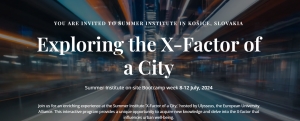
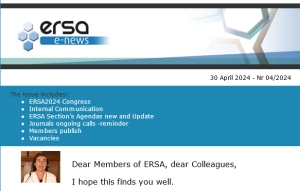

 Dear Members of ERSA, dear Colleagues,
Dear Members of ERSA, dear Colleagues,














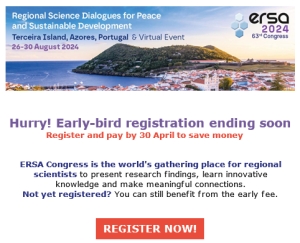
 · The Opening Ceremony will take place on Tuesday 27 August afternoon in Terceira.
· The Opening Ceremony will take place on Tuesday 27 August afternoon in Terceira. Why choose to join us in Terceira?
Why choose to join us in Terceira? Tips to organise your stay in Terceira
Tips to organise your stay in Terceira

